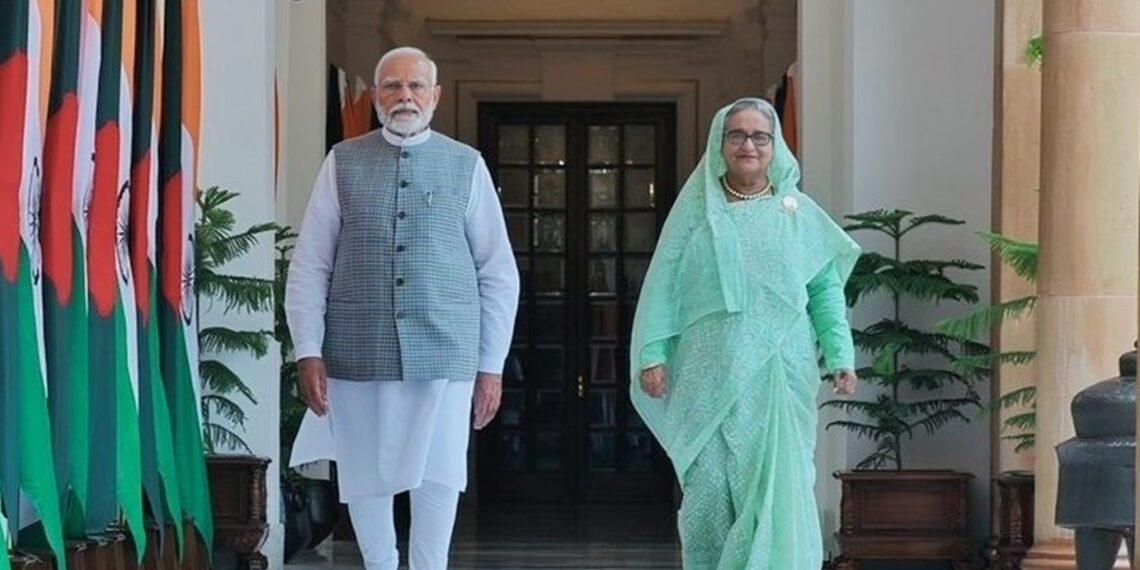Prime Minister Sheikh Hasina’s recent visit to India on June 21-22 carries significant strategic weight for both nations, with far-reaching implications for regional dynamics and bilateral relations.
This Bangladesh PM’s visit, marked by high-level talks and numerous agreements, aimed to bolster bilateral ties and address growing concerns over China’s expanding influence in the region.
The timing of the Bangladesh PM’s State Visit is of considerable importance as it precedes, her official visit to Beijing from July 8-11. This sequencing of visits underscores Bangladesh’s delicate balancing act between the two regional powers.
Strengthening Indo-Bangla Bond
Sheikh Hasina’s visit to India marks a significant step towards strengthening bilateral ties and addressing regional challenges. The discussions between the leaders underscored a shared vision for peace, prosperity, and development, focusing on connectivity, commerce, and collaboration.
During the visit, India and Bangladesh signed 10 Memorandum of Understanding (MoUs), covering areas such as connectivity, trade, defence, and water resource management.
These agreements signify a mutual commitment to strengthening bilateral ties and addressing regional challenges collectively. The emphasis on connectivity during the visit is particularly noteworthy.
Enhanced road, rail, and maritime links between India and Bangladesh facilitate trade and strengthen India’s access to its northeastern states. This improved connectivity aligns with India’s Act East policy, potentially transforming Bangladesh into a key transit hub linking South and Southeast Asia.
A critical area of discussion was the management of shared water resources as it addresses a longstanding issue between the two nations. Both nations prioritised data exchange and formulating a framework for interim water sharing based on the recommendations of the Joint Rivers Commission. India agreed to send a technical team for the conservation and management of the Teesta River inside Bangladesh.
Earlier in 2020, Bangladesh’s Economic Relations Division sought a $983 million loan from China for the Teesta River that involved dredging the river for navigability, building strong embankments, townships, industries on the two sides of the river, water reservoir and irrigation.
Through collaborating on the Teesta River conservation, India demonstrated its commitment to addressing Bangladesh’s concerns, potentially countering China’s attempts to gain leverage through water diplomacy.
China’s advances
The strategic significance of Sheikh Hasina’s visit extends beyond bilateral relations, reflecting broader geopolitical shifts in the Indian Ocean Region. As China’s Belt and Road Initiative (BRI) and the Peoples’ Liberation Army continue expanding their hegemonic influence, India’s engagement with Bangladesh becomes crucial in maintaining regional balance.
China has become a major economic and military partner for Bangladesh in recent years. Beijing has invested over $25 billion invested in Bangladeshi infrastructure projects. The bilateral trade between China and Bangladesh has grown from $3.3 billion in 2009-10 to more than $20 billion in 2021-22. Many Bangladeshi products have zero tariffs in China.
Beijing provided two submarines to Bangladesh Navy in 2016 for $205 million. China’s involvement in Bangladesh is particularly notable, with significant investments in infrastructure, including the BNS Sheikh Hasina submarine base in Cox’s Bazar and the acquisition of Ming-class submarines by Bangladesh.
This burgeoning relationship, especially naval cooperation, gives China increased influence in the Bay of Bengal region. It’s part of China’s broader efforts to expand its presence in the Indian Ocean, potentially challenging India’s traditional dominance in these waters.
South Asian Counterweight
Strengthening ties with Bangladesh is essential for India to ensure stability in the Indian Ocean and counter China’s expanding footprint. Bangladesh’s location at the heart of the Bay of Bengal and the larger Indian Ocean makes it a strategically vital partner for India. Enhancing connectivity, trade, and defence ties with Bangladesh will help India maintain a strategic edge in the region and ensure a stable and prosperous region.
Therefore, the two leaders on the occasion of the Bangladesh Prime Minister’s visit to India reiterated that Bangladesh is a critical partner for India in its broader regional policies, such as the “Neighbourhood First” policy, “Act East” policy, and the SAGAR (Security and Growth for All in the Region) doctrine.
The two leaders reiterated their commitment to a free, open, inclusive, secure, and rules-based Indo-Pacific region. India and Bangladesh also decided to co-lead the ‘Disaster Risk Reduction and Management’ pillar of the Indo-Pacific Oceans Initiative (IPOI) and address the adverse impact of climate change.
The defence cooperation agreements signed during Prime Minister Sheikh Hasina’s visit are particularly significant in the context of regional security. As Bangladesh modernises its armed forces, closer collaboration with India could help balance China’s growing military influence in the Bay of Bengal.
Joint exercises, training programs, and technology transfers could strengthen both countries’ capabilities to address common security challenges, including maritime threats and terrorism.
The two leaders also envisioned the India-Bangladesh relationship to become a major anchor for regional and sub-regional integration under the BIMSTEC, SAARC and IORA architectures and pledged to work together on global platforms to promote our common interests, especially the interests of Global South.
Limitations of the ‘Balancing Act’
However, while strengthening ties with India, Bangladesh will likely maintain its engagement with China, given the substantial Chinese investments in its infrastructure and economy.
Meanwhile, anti-India sentiments are growing in Bangladesh, fuelled by accusations of electoral interference, unresolved bilateral issues, and religious tensions, with critics leveraging these concerns to challenge Indian policies and influence.
hough, the Sheikh Hasina’s Awami League government in Bangladesh has been the cornerstone of strong India-Bangladesh relations for more than two decades, the sustainability of these ties after her tenure remains uncertain and a matter of concern.
Furthermore, the success of these agreements reached during PM Hasina’s visit will depend on their effective implementation. Past initiatives have sometimes faced delays or roadblocks due to bureaucratic hurdles or local opposition. Both governments will need to address these challenges proactively to realise the full potential of their partnership.
As the geopolitical churn in the Indian Ocean intensifies, this reinforced India-Bangladesh relationship could play a pivotal role in shaping the future of the region, balancing China’s influence, and fostering a more integrated and secure South Asia.















